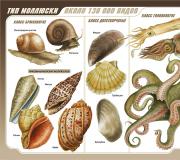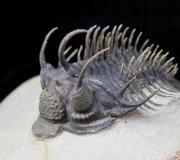Cat, what are you doing here? What happened to the boy from the film “Welcome, or No Trespassing” (4 photos)
Actor Vyacheslav Tsarev, who we remember as a boy with a butterfly net in Elem Klimov’s film “Welcome, or No Trespassing,” ended his life not in the blaze of glory, but in a small apartment on the outskirts of Moscow. This post will tell you how the actor’s fate turned out.
“Mom worked as a watchman at the second thermal power plant near the Kievsky station,” recalled Vyacheslav Valentinovich. – Dad was also a commoner. ...I am from the peasants, my God! We then lived in the village of Troitse-Golenichevo next to Mosfilm.
Once I was riding a trolleybus with friends, a “hare,” of course, and suddenly – the controller: “Your tickets?!” Everyone was scared, and he asked me: “Do you want to act in a movie?” I came home and said: “Mom, one guy invited me there, Klimov.”
Well, can you imagine? She got scared: “Glory, where are we going?” She went with me to the studio almost wearing an apron. There, damn..., everything is in bows, back and forth... And I’m alone - like an idiot. Funny..."
Two years later, Andrei Tarkovsky invited Slava to star in his film. The boy was 15 years old at the time.
“He was demanding,” recalled Vyacheslav Valentinovich. - Be gentle with me, because I am shorter and younger. […] But he didn’t let the kids down either. I say, I’m wasting film on you, lighting, make-up... How much money does everything cost! Pull yourself together! He was a psychologist..."

After graduating from high school, Tsarev served in the navy and got married. Then he worked as a loader in a liquor store, a cleaner in a psychiatric clinic near Moscow, an ice cream seller, and a janitor as a watchman.
Shortly before his death, cunning Moscow journalists found him, mercilessly describing the life of Vyacheslav Valentinovich:
“...In the Moscow district of Butovo, with great difficulty, we found a multi-storey house in which Vyacheslav Tsarev lives with his wife Lyudmila, an old cat and her two fat cat sons.
- I live simply. Poor. There is nothing to eat. Drink a lot.
Having invited us to go into the only small room, Vyacheslav Valentinovich began to talk about himself. As if he was making excuses.
The look of a tired man, as if after a night shift. Sad smile. Toothless mouth. Old clothes. Furniture includes a bulky antique wardrobe, a sideboard, a table, a couple of chairs, three beds (one has bricks instead of legs).
This is how a man lives who once starred with the masters of Russian cinematography.”

In 2012, under the care of the Necropolitan Society, a black stone stele was installed on his grave with a still from the film by Elem Klimov and the famous line of his hero: “What are you doing here, huh?”
Filmography
1963 - Short stories (episode “In Court”) - schoolboy
1964 - Welcome, or No Trespassing - boy with a net
1966 - Andrei Rublev - Andreika, foundry assistant
1967 - Tashkent - the city of grain - a swindler
1969 - At thirteen o'clock in the morning - Anchutka

Soviet comedy feature films are distinguished by plots that are familiar to every person who grew up with them, light irony and that indescribable flavor that turned them into an epoch-making phenomenon in the history of world cinema. Each of them has long been disassembled into phrases that have become catchphrases. We review such favorite films again and again, although we have seen them many times already, laughing and worrying along with their heroes.
In 1964, the debut full-length work of director Elem Klimov was released, which was simply doomed to success - “Welcome, or No Trespassing.”

The events of this legendary film take the viewer into the atmosphere of a classic pioneer camp. As it should be, in every film about children there is a wayward bully - in this case it turned out to be Kostya Inochkin. The tomboy, contrary to all the requirements of the administration, left the bathhouse and swam across the river, for which he was promptly expelled. Fearing the reaction of his strict grandmother, the boy secretly makes his way back to the camp and tries to “hold out” until the end of the shift, enlisting the help of his friends. But our story is not about him.

“What are you doing here, huh?” - one of the same phrases that we have already mentioned. The boy with the net was speaking - funny, curious and at the same time surprisingly sweet. He was played by a little-known actor with a difficult fate, Vyacheslav Tsarev, who was remembered by millions of fans of Soviet cinema for this particular role.

He was only 13 when he was chosen from three hundred applicants. The comic image, which most likely would have become Tsarev’s permanent role, was not considered the most prestigious at that time, but the boy was predicted to have a successful future, at least he could repeat the success of Savely Kramarov. However, he himself decided differently.
In those days, the Mosfilm film studio was located on the outskirts of the city. When castings for child actors were announced, the most frequent visitors were children from nearby villages. In one of them, Trinity-Golenichevo, Vyacheslav Valentinovich was born in 1951. Despite the fact that the role of the boy with the net made him famous, after graduating from school he went to serve in the navy, afraid that he had to study for another six years at the theater institute.

He has a total of 5 films under his belt. Although Tsarev was invited to work that was completely insignificant at first glance, each of them was memorable - he perfectly got used to the character. So, in the film “Tashkent - the City of Grain” the guy played a charming swindler - it seems that no one could have embodied this character better. 
His character Anchutka from the actor’s latest film “At Thirteen o’clock at Night,” filmed in the New Year’s revue genre, also immediately fell in love with the audience. However, he was no longer invited to the cinema - the guy developed addictions at too early an age, which he could not give up even for the sake of all-Union fame.

After serving in the navy, the young man got married, but family happiness was short-lived. After 5 years, the wife filed for divorce and took her only son. Tsarev never saw him again. The former actor did not have the opportunity to get a stable job - he never received a higher education. At different times, he sold ice cream, swept yards, loaded boxes in a liquor store, worked as a watchman and even as a cleaner in one of the psychiatric hospitals not far from the capital. However, the man did not stay anywhere for long - the fault was his progressive addiction to alcohol. It even got to the point where he, being out of his mind, signed over his apartment to a swindler and ended up on the street.
In one of the basements, Tsarev met a woman who was next to him for the next 25 years of his life - Lyuba. It was she who gave him a roof over his head, the couple even dreamed of a child who was never destined to be born. Unfortunately, the woman could not have children; moreover, she gladly shared her chosen one’s love for strong drinks.
They both “worked” in garbage dumps - they collected and handed over bottles and things that were still usable, and they preferred to spend the proceeds on alcohol. Nevertheless, the couple’s neighbors always spoke of Tsarev as the kindest person - he could not pass by a destitute animal, he was always ready to provide all possible help.
With the advent of retro fashion, the boy with the net was remembered by journalists who from time to time visited his poor house. Tsarev was looking forward to the fact that the directors would see a story about him and start inviting him to the cinema again, but this never happened.

On the 25th anniversary of their marriage, the couple planned to legalize their relationship, but this was not destined to happen. On June 28, 2006, without regaining consciousness after the second stroke, Vyacheslav Valentinovich died. Two months later, his faithful Lyuba also died. They were buried in different cemeteries - the woman’s relatives insisted that, at least after death, she be as far away from her common-law husband as possible.

“What are you doing here, huh?” - that’s all that the audience remembers about the promising young actor who made the wrong life choice. It is this that can be read on the tombstone just below the photograph of that same lop-eared boy with a net.
The destinies of child actors often turn out completely differently from what they themselves and the adults who pin their hopes on them expect. They remain hostage to their brightest characters, who remain the same in old films, while their own lives take a completely different path.
The film premiered on October 9, 1964 Elema Klimova“Welcome, or No Trespassing.” It was a debut. The director was worried. And for good reason. In deathly silence, members of the artistic council looked at the picture and left just as silently. The film was postponed... And after some time they showed it Khrushchev, and he had a lot of fun: it’s funny, let’s rent it!..
Five days after the premiere, the Plenum of the CPSU Central Committee decided to remove Khrushchev from office. But that's a completely different story.
He spoke about how the film “Welcome, or No Trespassing” was filmed, about Elem Klimov and about himself Vyacheslav Tsarev- the performer of the role of a boy with a net, remembered for one single, seemingly simple, but such a colorful phrase: “What are you doing here, huh?..”
In the 60s, he starred in five films, including Klimov’s, Tarkovsky And Shepitko. Fate gave him a great chance to get from rags to riches, and then dropped him to the very bottom. And now it’s time to make a movie about him - how you shouldn’t live...
One is like an idiot...
Slava was 12 years old when VGIK graduate Elem Klimov began filming his thesis “Welcome, or No Trespassing.” Slava went to school, was a pioneer, lived in the village of Troitse-Golenishchevo not far from Mosfilm, and after school he rode “hare” with the guys on a trolleybus.
A stern voice: “Your tickets?!” scared the boys to death. But after a minute, the “controller” stepped out of his role and, turning to Slavik, asked kindly: “Do you want to act in a movie?” The boy had a hard time imagining what it was like.
“My mother worked at a thermal power plant as a watchman, my father was also a commoner,” said Tsarev. “I’m telling you, I’m from the peasants, my God!”
Following Slava, a sister was born. There was no income in the family.
- Well, I passed the selection. He sang a song (the Pioneer anthem “Let the fires fly!”), danced, and recited the poem “Dragonfly and Ant.” At school I studied so-so. But I did everything that was asked. But of course!
— Were you bullied at school?
- What is this “hooligan” right away? Until now, it has not been stopped or attracted...
Klimov made strict demands on applicants for roles and did not immediately consider little Slava.
— Three hundred children came to audition. Elite, dressed up. Many parents are big shots... I’m the only one - like an idiot... I remember coming home: “Mom, I was invited to the filming there... Only one uncle... Klimov.” She was alarmed: “Slavochka, why? Where?". What she wore at home, she went with me to Mosfilm... Well, what can I say, we lived in the village, which means we were poor.
He never found out how much he received for the film that made him famous in 1964. The parents received the fee.
- I was number 13, ugh, Lord. Was involved throughout the entire film. Filmed in the pioneer camp "Eaglet". Then I even fell behind in school.
Klimov - dad in art
When the film, having overcome bureaucratic obstacles and freed itself from the “anti-Soviet” and “anti-Khrushchev” labels, finally came out, Slava Tsarev began to be recognized on the street. And even at the age of 50 they stopped us: we grew up watching your films.
- Good picture, I like it. What's the point there? Do you understand? “Children, you are the owners of the camp!” What kind of camp? Socialist, communist... Then we didn’t know a lot, didn’t understand.... Klimov was a genius. I called him the father of art. And he said: “I gave birth to you, I will kill you.” But I didn’t really want to voice it. Well, what child likes to be beaten?
- Did they really beat you?
- But of course! I was supposed to scream, but it just didn’t work out that way. Klimov was generally strict. Gave slaps on the head...
Fate was favorable to Tsarev. Saying: “You will be a good person,” she gave him a second chance and sent him to Tarkovsky in the film “Andrei Rublev.” Slava just had to listen to her...
- Tarkovsky is also a great director. I played Andreyka, Boriska’s friend (I starred in this role Nikolay Burlyaev. - Author). Oh, well, everything was more difficult for Andrei Arsenievich. We then traveled half the country: Kizhi, Vladimir, Suzdal, where for one square. There are almost 37 churches in km... And the film is generally cruel. So much blood! Tatar-Mongols. Slaughtered horses...
— How did Tarkovsky treat actors?
- Very wonderful, very wonderful! But at the same time he was demanding. Be gentle with me, after all, I am shorter and younger. But there were also people like, let’s say, Solzhenitsyn...
- Anatoly Solonitsyn?
- Ugh, my God, Solonitsyn, of course... The director was more kind with the kids. But he still didn’t let it go. If something went wrong, he scolded me: I’m wasting film, lighting, makeup on you. Come on, pull yourself together! The psychologist was excellent. When we broke up, I went to Yusupov, in the film “Tashkent - the city of grain”...
In fact, this picture was directed by an Uzbek director Shukhrat Abbasov. Tsarev probably made a mistake and forgot. He also said about Klimov’s film that he had to scream there. But why, if the role contains only two phrases: “What are you doing here, huh?” and after being sent away: “Okay, okay.” On the contrary, in “Rublev” Andreika is flogged, and, quite likely, Tarkovsky demanded a natural scream.
There was a feeling that Tsarev did not want to remember anything. After serving three years in the navy, he gave up filmmaking. Once and for all.
Cats and dolls
Having traveled the length and breadth of Butovo, the photographer and I finally found Tsarev’s house. We went without an invitation. The artist did not have a phone number...
It was not difficult to recognize the boy with the net. The same look, smile. Unless he asked: “What are you doing here, huh?”
However, no. The look was that of a man unbearably tired of life. A sad smile betrayed a fierce hatred of dentistry.
Short stature. A rumpled, wrinkled face. An old, torn sweater, turned whitish by cat hair. The rolled up jeans look like they were rented. Shoes from somewhere on the mezzanine, one for home and street. If you meet someone like this in the city, you will shy away from inertia...
Andrey Rublev" (1966-1969)The furnishings in the apartment are a silent but bright addition to the owner’s image.
“I live simply, even wretchedly.” There is nothing to eat. But drink a lot,” he seemed to be making excuses.
A huge wardrobe, a sideboard, a table, a couple of chairs and three beds (one on bricks) - that’s the entire interior of the small one-room apartment in which Tsarev, his wife Lyuda, an old mother cat and her two fat sons lived. It seems that animals only helped him remain human. They need to be fed and walked - a huge responsibility. Tsarev did not have to show care and love for the children.
— The first wife worked as a head waiter in a restaurant. But, apparently, she was not satisfied with the former artist - she found someone better. And my army friends introduced me to Luda. We've been together for half our lives already. She worked as a dispatcher at a construction site, and got this apartment there. But now on disability. Luda is my manufista - do you know what that is? She collects little dolls, and I help her! Not a single one in the collection is the same! Look, the little mouse is sleeping in the berry...
Showing the toys, Tsarev instantly transformed! The eyes lit up! Laughter, smile - well, just like in childhood. And he started talking about life - and again he turned sour.
Having repaid his debt to his homeland, he immediately got a job as a loader. When directors were offered roles, he refused. But why? Why didn't you choose the best place in the sun? Nothing in his life is clear...
There won't be a better life
- Well, I didn’t want to act anymore. Did not want!
— What did you plan to do?
- Well, don’t steal. I'm temporarily not working right now...
- It's a pity of course. Well started!
“I started well, but I end badly.”
- Maybe I’m sorry, we were stupid and didn’t think it was worth continuing? Was there anyone to advise?
- But this could be! Yes! Probably out of stupidity. Just got it into my head. I thought: why do I need this?
— Is it better to be a loader?
- May be.
- It's hard work.
- And there - mental. Here they put pressure on your hands, there on your brains.
Tsarev said that every time he was not satisfied with something in his job, that’s why he quit and moved to another one. To tell the truth: they often kicked me out. Including drunkenness.
- We barely found you. They said you drank yourself and died...
- Yes you?! Did they really say that? No, as you can see, he’s alive and well...
- Do you like to drink?
- Who doesn’t?.. And why not drink if you have it?
Tsarev was not drunk and that is why, probably, he was taciturn and sentimental. I sat sad...
— Would you be able to play now if you were invited?
“I’ll probably be scared of the camera too.” They haven’t called me for a long time... And the type is not the same. If only they find a role for me, they’ll make me up like Baba Yaga... But no... I’m no good: old, without teeth...
Tsarev’s parents, who at first were incredulous that their son was filming, were later proud of him. But they have been dead for many years. There are no friends left from the world of cinema. Army - who drinks, who injects drugs. And my only family members are my wife and sister. That’s why, probably, to the question: “How do you live without a phone?” - the artist sighed: “Who should I call?” And there was such genuine melancholy in his words! Such loneliness!
At that moment, he had been unemployed for two years. Occasionally, someone trusted us to unload something, gave us money or food. And so... Tsarev lived as a recluse. I didn't want anything. I didn't hope for anything.
- What to dream about? There will probably never be a better life.
At the same time, he did not complain, like many who were left out of work. He didn’t become embittered and didn’t curse the authorities. And despite all the troubles, he managed to remain human. Sincere, naive and kind.
On June 28, 2006, Vyacheslav Tsarev passed away. He was only 55. Or 54... The date of death is known, but the day and month of birth are not in the reference books. Such fate...




